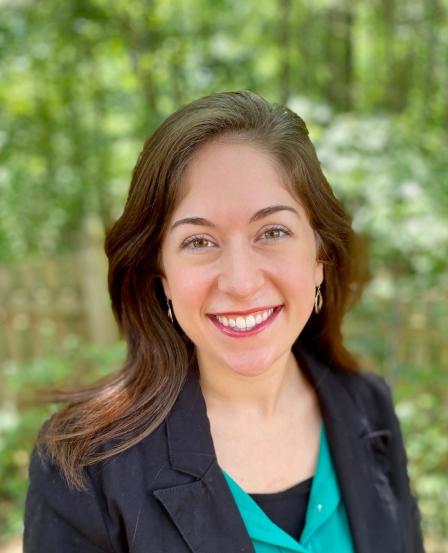Meet EPA Scientist Kelsey Miller, Ph.D.
 Meet EPA Scientist Kelsey MillerAnalytical chemist Kelsey Miller works to support EPA’s efforts to address per- and polyfluoroalkyl substances (PFAS). Her research focuses on developing targeted and non-targeted liquid chromatography-mass spectrometry methods for detection of PFAS in different environmental media.
Meet EPA Scientist Kelsey MillerAnalytical chemist Kelsey Miller works to support EPA’s efforts to address per- and polyfluoroalkyl substances (PFAS). Her research focuses on developing targeted and non-targeted liquid chromatography-mass spectrometry methods for detection of PFAS in different environmental media.
How does your science matter?
The scientific community is just beginning to scratch the surface of PFAS research. These emerging contaminants are a large group of persistent man-made chemicals, and we don’t fully understand the toxicological effects or which PFAS chemicals (or how much) are in the environment. My research aims to develop analytical methods that can better identify and quantify these compounds in our drinking water, soil, rivers, etc. These findings enhance our knowledge of PFAS exposure and can inform policymakers and the public.
Tell us about your background.
I received my B.S. in Chemistry from the College of William & Mary. While at college I conducted undergraduate research in an organic synthesis lab and I interned at the FBI Laboratory in Quantico, Virginia. Afterward I attended the University of North Carolina-Chapel Hill and earned a Ph.D. in Analytical Chemistry. My dissertation work involved using ultrahigh pressure liquid chromatography-mass spectrometry to improve separation of complex lipid mixtures. In September 2019, I began as a federal postdoctoral researcher at EPA.
What do you like most about your research?
I like that my research has the potential to improve the health of people and our environment. Working at EPA is a natural fit that combines my love of science and service. At my job I get to learn about new science and technology and apply that knowledge in a meaningful way that can lead to positive outcomes. I also really enjoy doing fieldwork!
If you could have dinner with any scientist, past or present, who would it be and what would you like to ask him or her?
I would dine with Marie Curie since she was a female pioneer in science who was amazingly accomplished and reportedly very humble. Marie was the first woman to win a Nobel Prize and the first person/only woman to win the Nobel Prize twice (Physics and Chemistry). I would inquire about her experience being one of the only women in science during that time and how she persevered.
When did you first know you wanted to pursue science?
Both of my parents are chemists, so I probably knew subconsciously that I wanted to pursue science when I was born. Consciously, I knew I wanted to be a chemist after taking my first chemistry class junior year of high school. Learning the subject matter felt natural to me and I wanted to know more and more. I especially liked how chemistry is so interdisciplinary.
If you were not a scientist, what do you think you would be doing?
If I weren’t a scientist, I think I’d be a veterinarian. I love animals and have always had pet cats or dogs since I was a youngster.
If you could have one superpower, what would it be and why?
My chosen superpower would be teleportation. I enjoy traveling to new places and teleportation would make my journeys much more efficient and affordable!
You’re stranded on a desert island; how would you use science to survive?
To survive on a desert island, I would engineer a desalination contraption to generate fresh drinking water. I would carve out wood to create two pots (one for boiling saltwater and one for collecting freshwater). Then I would create a condenser tube out of branches and leaves that would be angled from above the saltwater pot downward to the collection pot. The condenser tube would catch the water vapor from the boiling saltwater and as the steam cools the condensate would drip into the collection pot and voilà, freshwater.
Do you have any advice for students considering a career in science?
For students considering a career in science, I advise them to become comfortable with failure because a major component of the scientific process is trial and error. Failure is okay! Failing provides some of the biggest learning opportunities and leads to improvement...and new scientific discoveries.
Editor's Note: The opinions expressed herein are those of the researcher alone. EPA does not endorse the opinions or positions expressed.
